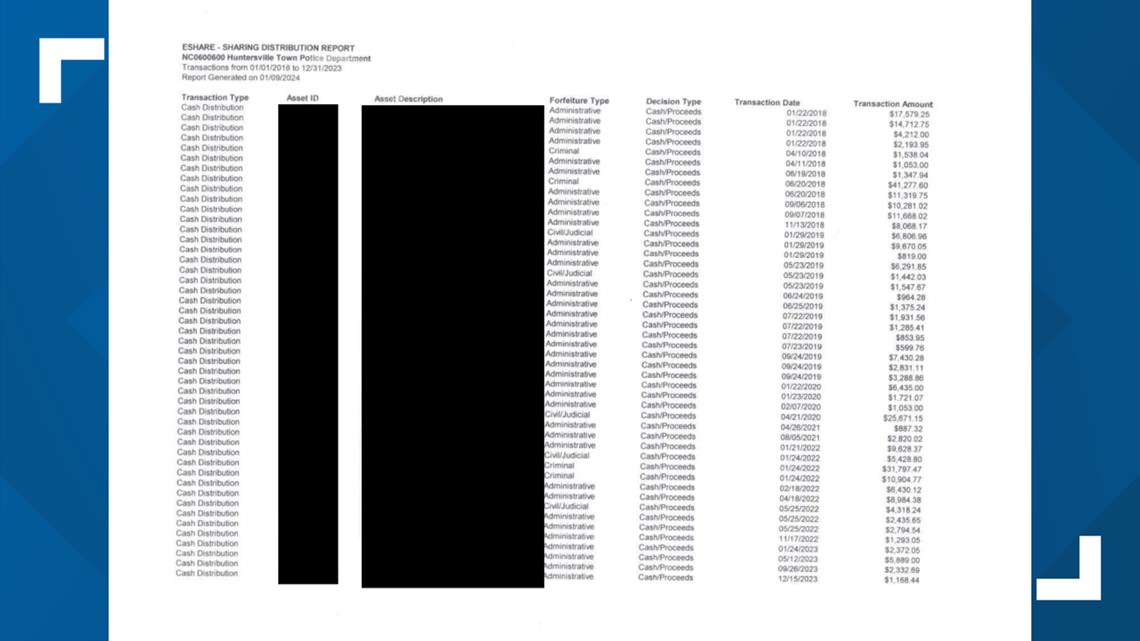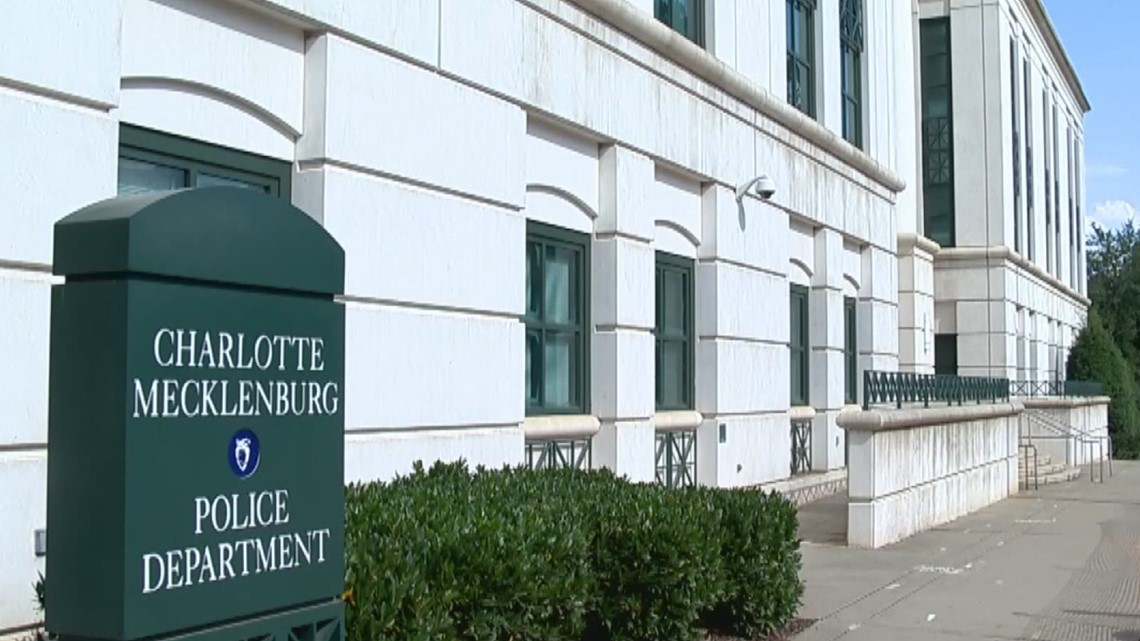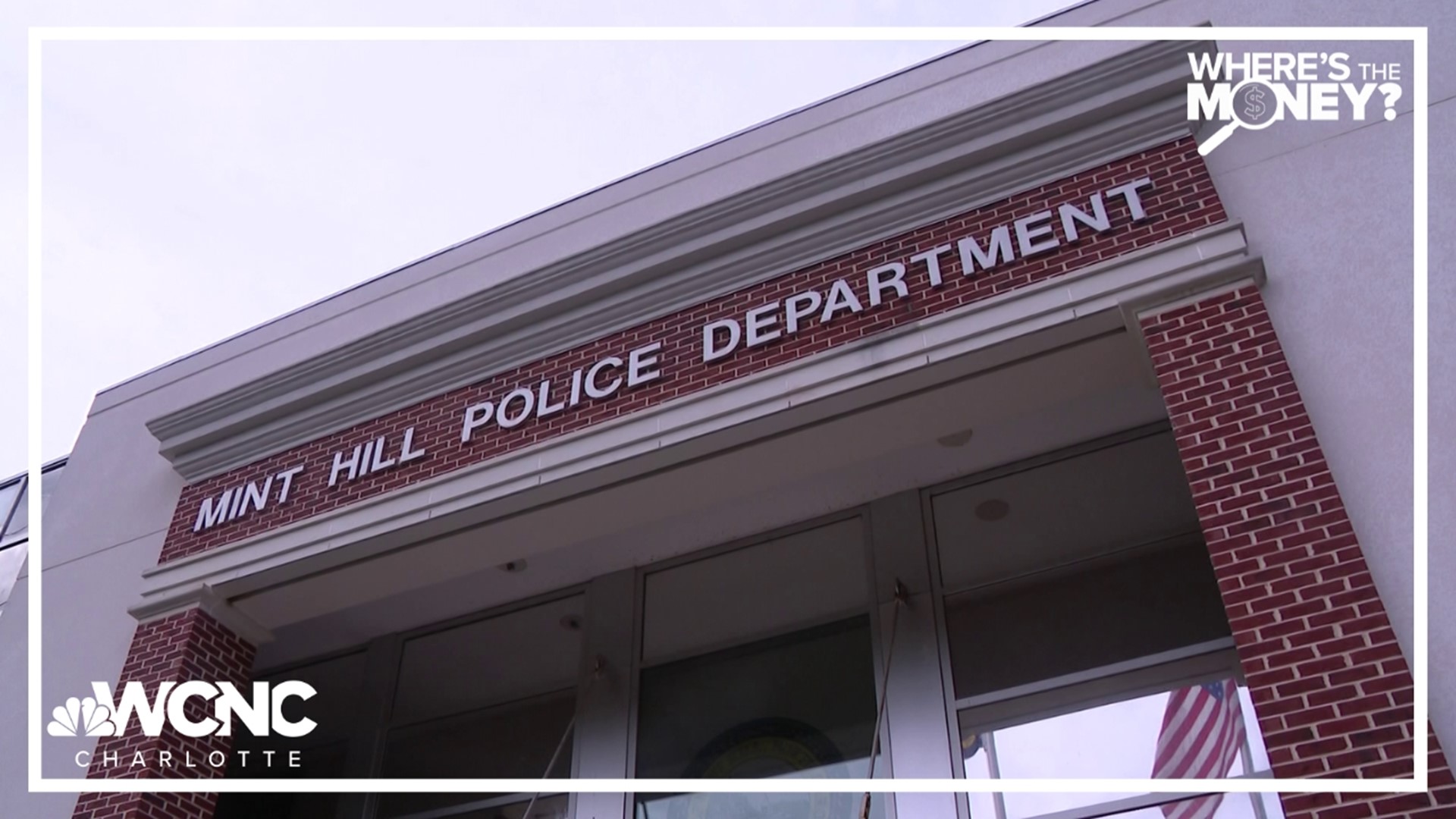CHARLOTTE, N.C. — Police departments across the area have seized and kept so much cash through a controversial asset forfeiture program, they've yet to spend it all. A WCNC Charlotte review of equitable sharing records shows those departments had a combined $16 million in their fund balances as of the end of the latest reporting period in June.
Critics call asset forfeiture "Policing for Profit," because they say it incentivizes police to take people's cash, even if there are no criminal charges tied to the money. Police departments have long defended the practice of asset forfeiture as a way to disrupt large criminal enterprises and inject the cash they seize into protecting their communities.
A WCNC Charlotte investigation previously found local police departments have collected almost $21 million by partnering with the federal government through the Equitable Sharing Program since 2018. Public records show departments have used some of that money for criminal investigations and training, travel, awards and memorials and to buy body cameras, generators, cars, a motorcycle, handguns and a golf cart to patrol the greenways, but public records show even after those expenses, their fund balances are still overflowing.


"They literally can't even spend that money," former prosecutor and criminal defense attorney Eric Rowell said. "It seems to be a problem where you're bringing in more money than you can obviously even spend."
Rowell, a resident of Huntersville, is on a crusade for more transparency and awareness of the practice, well aware of cases, including those WCNC Charlotte exposed, where police seizures took money away from people who were never convicted of any crime tied to the cash. In his town of Huntersville where he's unsuccessfully run for office twice, the police department's most recent annual report shows a combined $765,000 in forfeited money remains on hand.
WCNC Charlotte is always asking "where's the money?" If you need help, reach out to WCNC Charlotte by emailing money@wcnc.com.
"We need to know whether or not our local law enforcement is involved in taking money or property from potentially innocent individuals," Rowell said. "It's just a matter of just constantly being vigilant with our local government to make sure they're doing the right thing. I ask a lot of questions and I've gotten comfortable doing that. I do wish there were more people doing it."


Despite his election losses, some of the town's past and present elected leaders have raised concerns too. While Huntersville Police Chief Barry Graham has said during Board of Commissioners' meetings that he's hopeful the town can better track how these cases start and finish in the future, the department has said it is unable to provide specifics of past cases, including how many resulted in actual criminal convictions, but has insisted all cases are tied to large-scale criminal operations, specifically drug cases.
"We get asked the question, 'How many people's rights do we violate.' I would have to say zero. We've gotten no complaints, we've gotten no ethics violations..." Chief Graham previously said during one meeting in April 2023, defending the department's practices. "I think we're doing the right thing for the right reasons and I stand by it."
While the chief has said HPD doesn't target small cash seizures, public records show the department has received less than $1,000 in seized cash on at least five occasions since 2018 through administrative forfeitures. However, an HPD spokesperson clarified those amounts are strictly the department's cut of each total seizure; a percentage that is split between HPD and the corresponding federal agency that partnered on the case.
"The original amounts were much higher than this," Maj. Brian Vaughan said. "Well over $10,000."
State and local agencies can receive up to 80% of seized cash through the Equitable Sharing Program.


Maj. Vaughan told WCNC Charlotte the agency has "yet to determine the allocation" of its remaining Equitable Sharing funds.
"Historically, we have identified various needs, such as enhancing accessibility to our extensive network of greenways," Maj. Vaughan said of past expenses. "This has allowed us to make purposeful investments, such as the acquisition of a golf cart."


That department declined an on-camera interview, just like the Charlotte-Mecklenburg Police Department. CMPD told WCNC Charlotte the agency has a plan to spend all of its $8 million beginning in July, after the Charlotte City Council approves the next budget, but the police department has not yet revealed on what. WCNC Charlotte requested specifics more than two weeks ago, but CMPD hasn't provided an allocation breakdown. A spokesperson said the agency's finance department continues working on the request.
The millions that remain in CMPD's fund balance comes after the department spent $1.3 million of its cash the prior year, according to an annual report. The department used some of its money in recent months on a bomb truck to help respond to calls about explosives, barricaded SWAT Team calls and large events.
Allowed uses for the funds include law enforcement operations and investigations, training and education, law enforcement, public safety and detention facilities, law enforcement equipment, joint law enforcement/public safety equipment and operations, contracts for services, law enforcement travel and per diem, law enforcement awards and memorials, drug, gang and other education or awareness programs, matching grants, transfers to other participating law enforcement agencies, support of community-based programs, non-categorized expenditures and in limited cases, salaries.
A bi-partisan bill in Congress would end the Equitable Sharing program.
This investigation started with a viewer tip following WCNC Charlotte's "Forfeited" series that exposed local police departments' reliance on a federal loophole that lets police seize people's cash and keep most of it, without requiring criminal charges.
Contact Nate Morabito at nmorabito@wcnc.com if you have something WCNC Charlotte should investigate and follow him on Facebook, X and Instagram.
WCNC Charlotte's Where's The Money series is all about leveling the playing field in the Carolinas by helping others and breaking down barriers. WCNC Charlotte doesn't want our viewers to be taken advantage of, so we’re here to help. Watch previous stories where we ask the question “Where’s the Money” in the YouTube playlist below and subscribe to get updated when new videos are uploaded.

